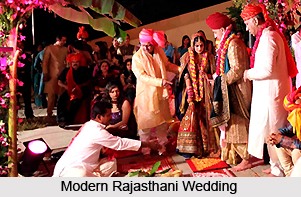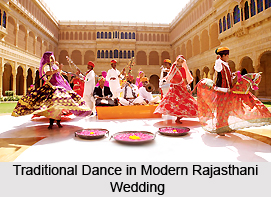 Modern Rajasthani wedding features exclusive rituals and vivid celebrations which render it uniqueness among other Indian weddings. Rajasthani wedding includes active participation of family and friends and showers a new vigour on the couple for the initiation of new life. A number of customs and rituals are performed during Rajasthani wedding and each of them has a specific significance and is symbolic of a certain philosophy. These rituals amidst an aura of fun and delight make the event immensely memorable.
Modern Rajasthani wedding features exclusive rituals and vivid celebrations which render it uniqueness among other Indian weddings. Rajasthani wedding includes active participation of family and friends and showers a new vigour on the couple for the initiation of new life. A number of customs and rituals are performed during Rajasthani wedding and each of them has a specific significance and is symbolic of a certain philosophy. These rituals amidst an aura of fun and delight make the event immensely memorable.
Pre Wedding Rituals of Modern Rajasthani Wedding
The beginning of a Rajasthani wedding is marked by the parent`s consent in both the families. Horoscope of the girl and the boy are matched in which at least 24 out of 36 attributes should match. Horoscope, also known as `Janampatri` is sent by the girl`s family to the groom`s house with a yellow Sathiaa or squire mark on it. After matching the horoscopes, the relationship is approved and consolidated by giving a silver coin and coconut to the groom and applying a `red tilak` as an auspicious mark on his forehead in a custom which is known as `roka` or `godh`. Subsequently the engagement is fixed in which the bride and groom exchange rings as a part of accepting each other.
Starting any auspicious work with Lord Ganesha`s blessings is an old tradition in India which is still followed in most of the events. It is known as `Ganapati Sthapna`. During the wedding preparations, the first invitation card is given to the deity in the hope of keeping the evil influences away. Traditional songs and dance form a significant part of the weddings in Rajasthan and promote an ambience of fun and gaiety. It starts from a few days before the wedding ceremony. Before 3-5 days of wedding, `Haldi and tel` (turmeric and oil) are applied on the bride, which is believed to impart a special glow to her. It is known as `Pithi Dastoor`. `Janeu` or the sacred thread ceremony is performed in the groom`s family a day prior to the marriage. `Palla Dastoor` is another important ceremony performed on the day of wedding in which the groom`s family brings bridal dress and jewellery to the bride which she wears during the wedding.
 Main Rituals of Modern Rajasthani Wedding
Main Rituals of Modern Rajasthani Wedding
Certain songs in Rajasthan have always been in vogue during the wedding ceremonies since ages and are meant especially for such events. On the day of wedding, potters wheel is worshipped by the mothers of bride and groom together in which they pray for the couple`s happiness. Modern Rajasthani weddings have vibrant venues, embellished with dazzling lights and beautiful blossoms. The `mandap` or the canopied platform where the main ceremony takes place is adorned with flowers and `rangoli`. Exquisite designs of `Mahendi` are applied on the palms and feet of the bride. The bride dresses in traditional `Rajasthani lehenga` and small `kurta` with `odhani` whereas the groom wears traditional `sherwani-churidar` along with `jooties` (Rajasthani shoes) and `safa` (turban) and takes a sword. The commencement of the marriage is marked by the entry of the groom on decorated horse or elephant along with the marriage procession, also known as `baraat`, which comprises the members of family, relatives and friends accompanied by local band, musicians and marshal torches. They are received by the family of the bride.
While entering the marriage hall, the groom needs to touch the `toran`, an auspicious embellishment made on the door by wood and flowers, with his sword. The ritual symbolizes his power and conquest and his ability to protect the bride. Afterwards the family of the bride welcomes the groom`s family with garlands, `tika` and `aarti` before taking them to the main venue. Meanwhile Kalash Puja` (worship of an auspicious pitcher) is also performed. When the priest announces the commencement of the marriage ceremony, the bride and the groom sit in the `mandap` and several rituals are performed such as chanting religious hymns, praying etc. The final ritual is the taking of `pheras` which is making seven rounds by the bride and groom together around a sacred fire. The act and the hymns chanted during the same signify the vows of being together till death. The ritual of `pheras` also marks another fun filled custom in which the shoes of the groom become a point of attraction for both the family members. The family of the bride looks out for an opportunity to hide them and demand some money from the groom in return whereas the groom`s family try to save them form the same. The custom promotes an ambience of fun and gaiety among the people.
Post Wedding Rituals in Modern Rajasthani Wedding
Post wedding the groom`s family takes the newly wedded couple to their home which is followed by `Griha Pravesh`, signifying the entry of the bride in the new family. Another ritual is performed by the newly wedded couple. The groom shifts seven metal plates with his sword and the bride arranges them on top of one another without making any noise. It is said that more the noise made by the bride while arranging, more would be the fight between them. Apart form this, other small rituals are also performed which completes a modern Rajasthani wedding.

















